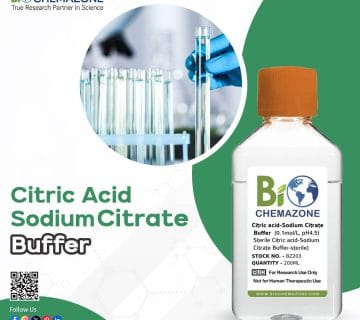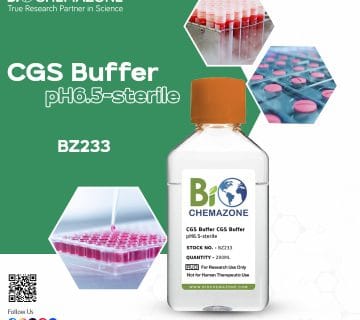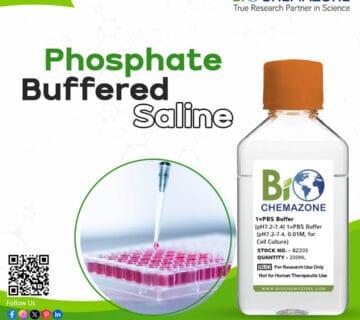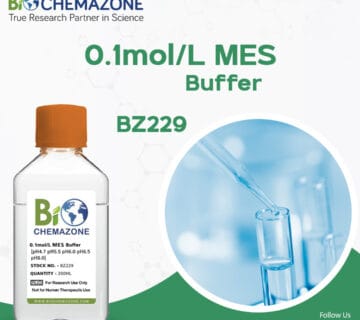Borate Buffered Saline, pH 8.0: Comprehensive Guide to Its Properties and Applications
Borate Buffered Saline (BBS), pH 8.0, is a vital tool in the world of biochemical and biotechnological research. Its unique ability to maintain stable alkaline pH, isotonicity, and bactericidal effects has made it a cornerstone in scientific workflows. Whether for dilutions, coatings, or other applications, BBS offers unmatched reliability and versatility.
In this article, we will explore the detailed properties, benefits, storage guidelines, and wide-ranging applications of Borate Buffered Saline. Additionally, we’ll provide practical tips for its use, making it an indispensable reference for researchers and laboratory professionals.
Purchase Borate Buffered Saline, pH 8.0, here.
What Is Borate Buffered Saline (BBS)?
Borate Buffered Saline, or BBS, is a buffered saline solution containing 10 mM Sodium borate, designed specifically to maintain a stable pH level of 8.0. Buffers like BBS are critical in biochemical procedures as they ensure a controlled environment, allowing reactions to occur without disruptions caused by pH fluctuations.
Buffers in the alkaline range (pH 8–10) are especially useful in experiments that involve sensitive reagents, enzymatic reactions, and protein interactions. BBS achieves this balance, supporting stable and reproducible results.
Key Properties of BBS
1. Alkaline Buffering Capacity
BBS’s most distinguishing feature is its ability to maintain a stable alkaline pH. This property is particularly important in procedures where acidic or neutral pH levels might degrade samples or affect enzymatic activities. Its 10 mM Sodium borate concentration provides reliable buffering.
2. Isotonic Nature
Isotonic solutions are designed to mimic the osmotic pressure of biological fluids, preventing osmotic stress on cells. This property makes BBS suitable for handling biological samples, ensuring their structural and functional integrity.
3. Bactericidal Effects
BBS possesses inherent bactericidal properties, which help to reduce the risk of contamination. This characteristic makes it ideal for long-term storage, coating procedures, and experiments that require sterility.
Advantages of Using Borate Buffered Saline
1. Consistent pH Stability
One of the primary advantages of BBS is its consistent pH stability. Variations in pH can lead to inaccurate results, denatured proteins, or compromised reagents. With BBS, these risks are minimized, making it a preferred choice for sensitive experiments.
2. Wide Applicability
Thanks to its compatibility with biological specimens, BBS can be used in:
- Protein studies: Ensures proper folding and activity of proteins.
- Immunoassays: Provides a stable environment for antibody-antigen interactions.
- Cell culture work: Maintains a balanced medium for cellular experiments.
3. Longevity and Ease of Use
The extended shelf life of BBS (12 months) reduces waste and ensures that laboratories can rely on its efficacy over time. Moreover, its transport stability at room temperature eliminates the need for specialized refrigeration.
Uses of Borate Buffered Saline
The flexibility of BBS allows it to serve various roles across scientific disciplines.
1. Immunological Assays
BBS is a critical component in immunological studies, such as ELISA and Western blotting. It serves as a coating buffer for microplates, ensuring that antigens or antibodies bind effectively to the assay surface. Its buffering capacity and isotonicity maintain the stability of the immune complexes during these processes.
2. Protein and Enzyme Studies
In studies involving proteins and enzymes, BBS ensures a controlled environment to preserve their structural integrity and biological activity. It prevents denaturation caused by pH changes, allowing for accurate analysis of protein interactions and enzymatic kinetics.
3. DNA and RNA Handling
Molecular biology workflows involving nucleic acids often require stable buffers to avoid degradation. BBS provides an ideal solution for maintaining the stability and integrity of DNA and RNA during procedures like hybridization and electrophoresis.
4. Sample Storage
The bactericidal nature of BBS makes it suitable for storing biological samples such as cells, tissues, and reagents. It minimizes microbial contamination, extending the usability of stored materials.
5. Dilution Medium
In laboratories, BBS is widely used as a medium for diluting concentrated reagents, antibodies, or other solutions. Its isotonicity ensures that the diluted materials retain their biological functionality without aggregation or precipitation.
6. Washing Steps in Assays
When combined with surfactants like Tween 20, BBS becomes an effective washing buffer in assays. It removes non-specific bindings while maintaining the specific interactions required for accurate results.
7. Blocking Non-Specific Binding
BBS can be customized with additives like milk powder or BSA to act as a blocking buffer. This prevents non-specific binding in immunological and biochemical assays, enhancing the sensitivity and specificity of the results.
Applications of Borate Buffered Saline
Borate Buffered Saline’s versatility enables it to be employed in various biochemical and molecular biology protocols. Below are some of its common applications:
1. Washing Buffer
In laboratory assays such as ELISA (Enzyme-Linked Immunosorbent Assay), washing steps are essential to remove unbound materials. When Tween 20 is added to BBS, it becomes an effective washing buffer that enhances assay specificity by eliminating non-specific bindings.
2. Blocking Buffer
For applications such as coating procedures in immunoassays, BBS can be mixed with milk powder or bovine serum albumin (BSA) to block non-specific binding sites on surfaces. This ensures that the target molecules bind exclusively to the intended sites, improving the accuracy of the results.
3. Dilution Medium
BBS is frequently used as a dilution buffer for reagents, including antibodies, enzymes, and proteins. Its isotonic nature ensures that diluted components maintain their functional properties without precipitation or degradation.
4. Storage Solution
The bactericidal properties of BBS make it an excellent medium for storing biological specimens and reagents. It minimizes microbial growth, ensuring that stored materials remain uncontaminated and usable over time.
Transport and Storage Guidelines
Room Temperature Stability
One of the most significant advantages of BBS is its ability to remain stable at room temperature. Unlike other buffers that may require cold storage, BBS simplifies logistics and storage by eliminating the need for refrigeration.
This feature is particularly beneficial for laboratories in remote locations or those without access to specialized cold-chain storage facilities.
12-Month Shelf Life
BBS has a validated shelf life of 12 months, provided it is stored properly. To maximize its lifespan:
- Keep the container tightly sealed to prevent evaporation or contamination.
- Store away from direct sunlight and extreme temperature fluctuations.
- Avoid introducing additives unless they are required for specific applications.
Practical Tips for Using Borate Buffered Saline
1. Ready-to-Use Solution
BBS comes pre-prepared, saving time and effort during laboratory procedures. It eliminates the need for mixing or calibration, providing a hassle-free experience for researchers.
2. Additive Compatibility
Depending on your application, BBS can be enhanced with additives such as:
- Tween 20: For washing steps in immunoassays.
- Milk Powder/BSA: For blocking non-specific binding in coating procedures.
- Protease Inhibitors: To prevent protein degradation in specific assays.
3. Handling and Disposal
- Use clean pipettes and containers to avoid cross-contamination.
- Follow laboratory safety protocols when handling and disposing of used buffer solutions.
Why Choose Borate Buffered Saline, pH 8.0?
Choosing the right buffer solution is critical for the success of laboratory experiments. BBS stands out due to its reliability, ease of use, and versatility. Whether you are conducting high-stakes biochemical research or routine laboratory work, BBS provides the consistency and performance required for accurate results.
Key Benefits Recap
- Stable alkaline pH of 8.0.
- Isotonic composition for compatibility with biological samples.
- Bactericidal properties for contamination control.
- Room temperature stability and 12-month shelf life.
Order your Borate Buffered Saline, pH 8.0 today.
FAQs about Borate Buffered Saline
1. What is the primary function of Borate Buffered Saline?
BBS is designed to maintain a stable alkaline pH and provide isotonic conditions, making it ideal for various biochemical and molecular biology applications.
2. How long can Borate Buffered Saline be stored?
BBS has a shelf life of 12 months when stored in a sealed container at room temperature, away from direct sunlight.
3. Can additives be added to BBS?
Yes, additives like Tween 20 and milk powder can be incorporated to enhance its functionality for specific applications such as washing or blocking buffers.
4. Is BBS suitable for protein studies?
Absolutely. BBS helps maintain protein stability and activity, making it ideal for protein assays and enzymatic studies.
5. What makes BBS a preferred choice for researchers?
Its stable pH, isotonicity, bactericidal properties, and ease of use make it a reliable choice for diverse laboratory applications.
6. Where can I purchase Borate Buffered Saline, pH 8.0?
You can purchase it online from Biochemazone™.
Borate Buffered Saline, pH 8.0, is an essential buffer for researchers and scientists. Its unmatched reliability, coupled with its broad applications, makes it a must-have for modern laboratories. Order today and elevate your research with this high-quality buffer solution.







